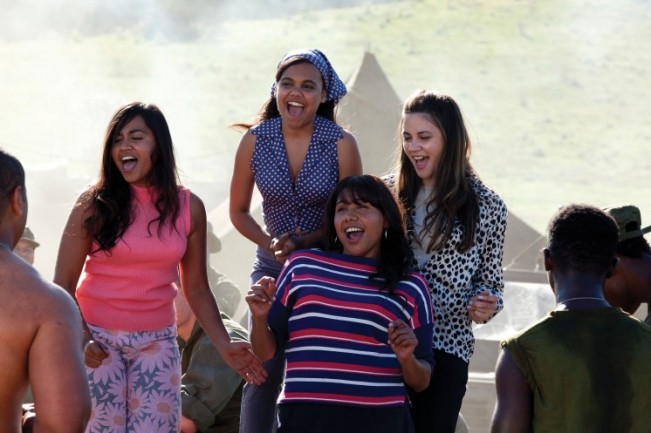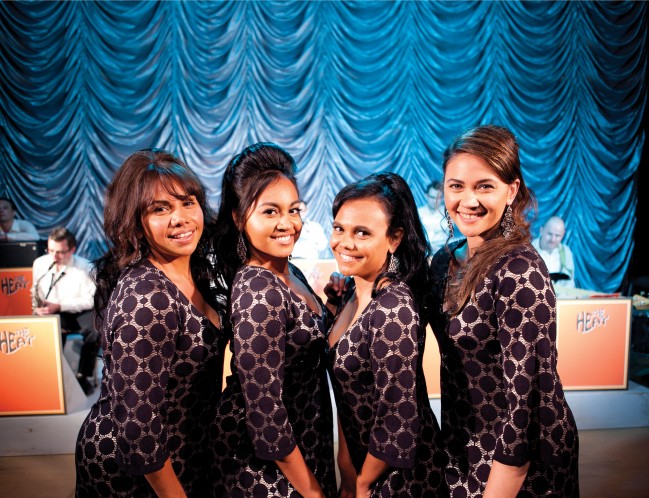
By Andrea Gronvall andreagronvall@aol.com
The Gronvall Report: Down Under On Their Way Up With THE SAPPHIRES’ Blair And Mauboy
There are more reasons than better weather to cheer the arrival of spring; gone are the dog days of January and February, when multiplexes were still showing either awards season titles or disposable new features studios were dumping for a quick theatrical run before video release. Finally some decent movies are on screen, and one of the most enjoyable right now is a musical drama-comedy from Australia, The Sapphires. A little movie with a big heart and a great vibe, it’s the story of three Aboriginal sisters—Gail (Deborah Mailman), Cynthia (Miranda Tapsell), and Julie (Jessica Mauboy)—who dream of becoming country and western singers in 1968 Victoria. Luckily for them they meet Dave, a down-at-heels music promoter (Chris O’Dowd) who sells them on soul instead. Tired of fighting racism at home, the sisters enlist their cousin Kay (Shari Sebbens) to make their trio a quartet, and with Dave as their manager head to Vietnam for a gig singing to American troops. Based on a stage musical by Tony Briggs (who was inspired by his own family’s history), the movie has a period look that’s spot-on, and a soundtrack full of Sixties hits that have stood the test of time. The Weinstein Company recently flew director Wayne Blair and star Mauboy to the States for a series of interviews; I caught up with them at (appropriately) The House of Blues.
Andrea Gronvall: Not having seen the original stage production, I’m wondering how—beyond, obviously, your use of locations—did you open up the play for the big screen?
 Wayne Blair: We changed half the songs because we had more to play with. We also fleshed out the characters to a greater extent; in the movie we start with the four female protagonists as youngsters, which wasn’t the case in the play. And the character of Dave [Chris O’Dowd] is Irish in the film, but he was Australian on the stage.
Wayne Blair: We changed half the songs because we had more to play with. We also fleshed out the characters to a greater extent; in the movie we start with the four female protagonists as youngsters, which wasn’t the case in the play. And the character of Dave [Chris O’Dowd] is Irish in the film, but he was Australian on the stage.
AG: You were under a lot of pressure with a tight budget and a rigorous shooting schedule. One of your producers, Kylie de Fresne, said Ho Chi Minh City was “a pretty crazy place to make a film.” How did you handle the stress?
WB: During the shoot, I didn’t have time to think, I just had to keep moving. And then in the evenings I screened dailies. But apart from the night right before shooting began, when I didn’t sleep well, I was so tired at the end of every day that I slept like a baby. We covered nine locations in six weeks. For me, the challenges in shooting in Vietnam were not about culture clashes, or even language—a lot of the Vietnamese people speak at least a little English, but when language is a barrier, you can usually make your intentions clear through gestures. For me, the difficulty mostly was the distances we had to travel: two and a half hours from the city into the country to shoot the group performing for the troops at remote sites.
AG: There’s a sequence in The Sapphires that is key to the appeal of the movie, and gets right to the heart of what soul is all about. It’s when Dave coaches the girls, “Country and western music is about loss. Soul music is also about loss. But the difference is, in country and western music they’ve lost, they’ve given up, and they’re just at home whining about it. In soul music they’re struggling to get it back, and they haven’t given up—”
WB: “—so every note that passes through your lips should have the tone of a woman who’s gasping and fighting and desperate to retrieve what’s been taken from her.” I wrote that, together with Tony Briggs.
 AG: I love those lines. They set the tone, and they set up our expectations—which the characters meet. Jessica, I didn’t see your appearances on “Australian Idol,” so I don’t know what material you performed. I will say that I find the trend of the kind of “power ballads” that “American Idol” and “The Voice” and “Smash” promote is getting tedious. What’s refreshing about your numbers in The Sapphires is that you respect those great songs from the Sixties; you don’t try to upstage them. You serve the songs, and so the songs serve you, and in the process you become incandescent. You really get it.
AG: I love those lines. They set the tone, and they set up our expectations—which the characters meet. Jessica, I didn’t see your appearances on “Australian Idol,” so I don’t know what material you performed. I will say that I find the trend of the kind of “power ballads” that “American Idol” and “The Voice” and “Smash” promote is getting tedious. What’s refreshing about your numbers in The Sapphires is that you respect those great songs from the Sixties; you don’t try to upstage them. You serve the songs, and so the songs serve you, and in the process you become incandescent. You really get it.
Jessica Mauboy: Thank you! When it came time to audition for “Aussie Idol” at first I didn’t want to do it. But I was really lucky that I had supportive parents and enough confidence to go ahead. I was 16 at the time. “Idol” has a process: you have to choose from the list of songs the show gives you to perform. I only made it to runner-up, but that opened doors to a record contract; I’m currently working on my third studio album.
I feel the same as you about the music in The Sapphires. On those songs I worked with Wayne and with Bryan Jones, who’s the top soul producer in Australia. I also got the chance to meet the real-life women who inspired the play and the movie–sophisticated and really strong women, who took the time to talk with us about their lives. By the time filming started, I had a sense of who my character was, and could tell her story through the songs.
AG: One thing I noticed in the movie is that the competitiveness and the combativeness between the three sisters spill over into their dealings with the outside world. They don’t take any guff from anyone, including men. Were these women ahead of their time, or is their brash toughness a part of Aboriginal culture?
JM: A certain amount of intensity and aggressiveness I’d say are part of Aboriginal culture.
WB: You know where you stand right away, rather than pussyfoot around each other.
AG: So what’s next for you two? When are we going to see you on the screen again, Jessica?
JM: If the opportunity comes up, I’d like to do a film again. I’ll be traveling back and forth to New York and L.A. for the next couple of years, to work with music producers Harvey Mason, Jr. and Rodney “Darkchild” Jerkins. I’ll be spending the whole of April in L.A.
WB: I’ll be working on “Redfern Now,” a TV series for ITA/ABC.
AG: Have you been getting any film offers?
WB: I’m reviewing a number of movie projects, yes.
AG: Anything exciting?
WB: It’s all exciting now.













